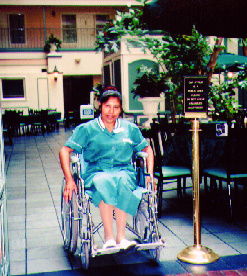Creative Approaches to the Americans with Disabilities Act
by Jane Boyd Ohlin
Jane Boyd Ohlin, J.D., is an assistant professor in the department of hospitality administration at Florida State University. Technical input for this article was provided by Paul Duke, founder of Opening Doors®, the firm responsible for implementing the training program discussed in the following article.
STAFF INVOLVEMENT
The best-designed amenities and architectural plans are of little value, however, if employees are uncomfortable serving guests with disabilities.
Awareness Training
Recognizing the potential for untrained staff to undermine the company's efforts to reach out to guests with disabilities, Embassy Suites trained its employees to be aware of guests' special needs. That revised training plan included the involvement of people with disabilities in the training program as well as exercises that simulated for employees the difficulties and challenges regularly faced by guests who have some disability. Employees were taught not to be fearful of guests with disabilities and were given instruction in how to address comfortably and naturally the needs of guests.
People who do not have disabilities and people who have seldom been around those who do may ignore people with disabilities for fear of saying or doing the wrong thing. For example, employees are taught to ask a guest with a disability, "How may I help you?" rather than just saying "Let me take that from you" or "Let me do that for you."
Servers are also trained to assist patrons in locating condiments and other table items. For example, a server might inform guests who are visually impaired that the salt and pepper shakers are located at "twelve o'clock," the water goblet is at "one o'clock," the napkin is at "eleven o'clock," and so on.
At the front desk. To further assist guests who are visually impaired, front-desk employees and cashiers are trained to give change in separate denominations and to tell the guests what the denominations are, so that they can be folded separately.
Training in the housekeeping department involved teaching housekeepers to leave guests' personal belongings precisely where they were found once the guest room has been cleaned. The purpose of this is to accommodate guests' ability to find their belongings after the room has been cleaned.
TRAINING EXERCISES
During the training session, employees use devices designed to simulate common disabilities including arthritis, blindness, paralysis, and hearing impairments.
Employees learn to avoid ambiguous expressions like "over there" or "near the table by the palm tree." Employees are trained to mention obstacles and to give directions based on the perspective of a person who is visually disabled.
"Wheelchair etiquette" is also taught. For instance, employees learn that people in wheelchairs consider the chair part of their private space and that to grab the chair is an invasion of their privacy. Employees are taught that it's not rude to ask people to repeat what they are saying or to write down the message if they are not being understood.
CREATIVITY
Embassy Suites has approached the Americans with Disabilities Act with creativity and sensitivity. In addition to satisfying the physical requirements of the ADA, the personal preferences of many guests have also been addressed. Moreover, intensive training sessions for employees have been held in each of the Embassy Suites across the nation. The response by all guests has been positive, but especially so from people with disabilities.


